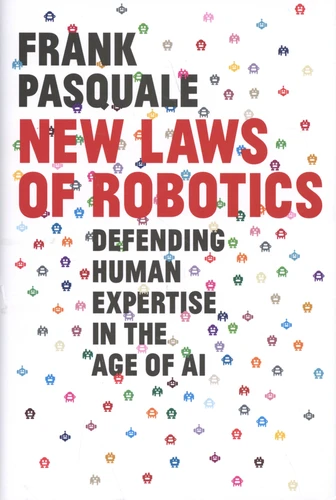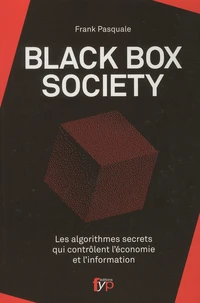New Laws of Robotics. Defending Human Expertise in the Age of AI
Par :Formats :
Définitivement indisponible
Cet article ne peut plus être commandé sur notre site (ouvrage épuisé ou plus commercialisé). Il se peut néanmoins que l'éditeur imprime une nouvelle édition de cet ouvrage à l'avenir. Nous vous invitons donc à revenir périodiquement sur notre site.
- Paiement en ligne :
- Livraison à domicile ou en point Mondial Relay indisponible
- Retrait Click and Collect en magasin gratuit
- Réservation en ligne avec paiement en magasin :
- Indisponible pour réserver et payer en magasin
- Nombre de pages330
- PrésentationRelié
- FormatGrand Format
- Poids0.515 kg
- Dimensions14,7 cm × 21,8 cm × 3,2 cm
- ISBN978-0-674-97522-4
- EAN9780674975224
- Date de parution01/12/2020
- ÉditeurThe Belknap Press of Harvard Uni...
Résumé
Too many CEOs tell a simple story about the future of work : if a machine can do what you do, your job will be automated. They envision everyone from doctors to soldiers rendered superfluous by evermore-powerful AI. They offer stark alternatives : make robots or be replaced by them. Another story is possible. In virtually every walk of life, robotic systems can make labor more valuable, not less. Frank Pasquale tells the story of nurses, teachers, designers, and others who partner with technologists, rather than meekly serving as data sources for their computerized replacements.
This cooperation reveals the kind of technological advance that could bring us all better health care, education, and more, while maintaining meaningful work. These partnerships also show how law and regulation can promote prosperity for all, rather than a zero-sum race of humans against machines. How far should AI be entrusted to assume tasks once performed by humans ? What is gained and lost when it does ? What is the optimal mix of robotic and human interaction ? New Laws of Robotics makes the case that policymakers must not allow corporations or engineers to answer these questions alone.
The kind of automation we get—and who it benefits—will depend on myriad small decisions about how to develop AI. Pasquale proposes ways to democratize that decision making, rather than centralize it in unaccountable firms. Sober yet optimistic, New Laws of Robotics offers an inspiring vision of technological progress, in which human capacities and expertise are the irreplaceable center of an inclusive economy.
This cooperation reveals the kind of technological advance that could bring us all better health care, education, and more, while maintaining meaningful work. These partnerships also show how law and regulation can promote prosperity for all, rather than a zero-sum race of humans against machines. How far should AI be entrusted to assume tasks once performed by humans ? What is gained and lost when it does ? What is the optimal mix of robotic and human interaction ? New Laws of Robotics makes the case that policymakers must not allow corporations or engineers to answer these questions alone.
The kind of automation we get—and who it benefits—will depend on myriad small decisions about how to develop AI. Pasquale proposes ways to democratize that decision making, rather than centralize it in unaccountable firms. Sober yet optimistic, New Laws of Robotics offers an inspiring vision of technological progress, in which human capacities and expertise are the irreplaceable center of an inclusive economy.
Too many CEOs tell a simple story about the future of work : if a machine can do what you do, your job will be automated. They envision everyone from doctors to soldiers rendered superfluous by evermore-powerful AI. They offer stark alternatives : make robots or be replaced by them. Another story is possible. In virtually every walk of life, robotic systems can make labor more valuable, not less. Frank Pasquale tells the story of nurses, teachers, designers, and others who partner with technologists, rather than meekly serving as data sources for their computerized replacements.
This cooperation reveals the kind of technological advance that could bring us all better health care, education, and more, while maintaining meaningful work. These partnerships also show how law and regulation can promote prosperity for all, rather than a zero-sum race of humans against machines. How far should AI be entrusted to assume tasks once performed by humans ? What is gained and lost when it does ? What is the optimal mix of robotic and human interaction ? New Laws of Robotics makes the case that policymakers must not allow corporations or engineers to answer these questions alone.
The kind of automation we get—and who it benefits—will depend on myriad small decisions about how to develop AI. Pasquale proposes ways to democratize that decision making, rather than centralize it in unaccountable firms. Sober yet optimistic, New Laws of Robotics offers an inspiring vision of technological progress, in which human capacities and expertise are the irreplaceable center of an inclusive economy.
This cooperation reveals the kind of technological advance that could bring us all better health care, education, and more, while maintaining meaningful work. These partnerships also show how law and regulation can promote prosperity for all, rather than a zero-sum race of humans against machines. How far should AI be entrusted to assume tasks once performed by humans ? What is gained and lost when it does ? What is the optimal mix of robotic and human interaction ? New Laws of Robotics makes the case that policymakers must not allow corporations or engineers to answer these questions alone.
The kind of automation we get—and who it benefits—will depend on myriad small decisions about how to develop AI. Pasquale proposes ways to democratize that decision making, rather than centralize it in unaccountable firms. Sober yet optimistic, New Laws of Robotics offers an inspiring vision of technological progress, in which human capacities and expertise are the irreplaceable center of an inclusive economy.


